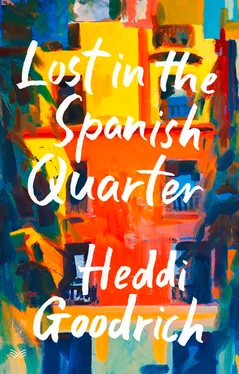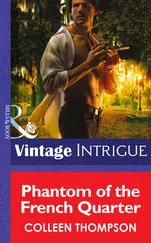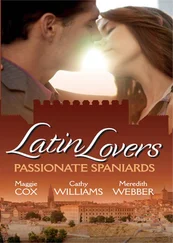1 ...8 9 10 12 13 14 ...20 I RAN INTO PIETRO two days later near my university. Without much small talk, he invited me for a coffee that afternoon at the house he shared with his brother. Around four o’clock, he suggested, scribbling on a scrap of paper “Via De Deo, 33. Iannace.” Their place was in the Spanish Quarter, apparently only four or five blocks from mine.
Yet on the way there I got lost, just as the neighborhood had hoped I would. Its grid pattern of streets had been designed for just that since their conception as Spanish military barracks. Nearly identical cafés, fruit vendors, and makeshift stalls with eggs or contraband cigarettes on every corner heightened the mirror effect of that grid, which was ideal for keeping the outsider out and the insider in.
To overcome this problem, I’d memorized paths through the quarter. For example, from my building to the Orientale it was left, left again, then right at the street shrine, then straight, sidestepping the puddles under the trays of octopus and mussels, until the street exhaled me out of the quarter and onto the main boulevard, Via Roma. Guided by a sort of muscle memory, I could walk through it all unscathed, even untouched, as if balancing on a tightrope drawn past the antennae and the hanging laundry, through the smog and the hollering. The Spanish Quarter couldn’t be conquered, yet by following such routes I maintained the necessary control to navigate it practically with my eyes closed. But Via De Deo wasn’t on any path I knew. I held on tight to my book bag, occasionally letting my eyes dart up to the street plaques.
“Hey, toothpick!”
It was a young girl who’d checked me out and summed me up and was now staring me down, raring for a catfight; she may have only been nine years old, but in Neapolitan years that was something like nineteen. It was always hard to tell what the locals thought of us university lodgers. It was said that they tried to shield us from their criminal dealings, but who knows. Sometimes they appeared curious, at other times violated. But mostly they looked at us the same way they looked at the neighborhood’s stray dogs, with annoyance but not without tenderness, and kept us at arm’s length.
The girl gave up and moved on. Out of the corner of my eye I saw something black and white run up a side street and into a vascio . A goat, I was almost sure. And I thought I’d seen everything there was to see in the Quartieri, including a white rabbit living in the woodpile under a pizza maker’s oven. The goat seemed like a good sign and I dived into the alleyway after it. There was a farm smell but no trace of the animal. Locals were glaring at me from their doorways. I kept my eyes glued to the volcanic street stones, but I could already feel panic digging into my bewildered feet with its small, desperate claws.
I recoiled into the first right-hand alley. A deli, thank goodness. I took cover under the dangling meat and stole a glimpse at the street sign. Via De Deo. So much like Dio , it occurred to me. Real or not, the goat had shown me the way. Naples always came through for me in the end.
My thighs tensed up as I made my way up the steep incline. It gave the motorbikes a good workout too: men drove up it with their heads down in concentration, fat widows rode on the back, sidesaddle as their skirts and their years required. Women heaved uphill the burden of their shopping and of their children. Twenty-three. Twenty-five. Twenty-seven. My heart was racing. I blamed it on that ridiculous street, which, if it didn’t ease soon, would take me all the way to San Martino, the monastery just beyond the Spanish Quarter that appeared to hover above it like the very gates of heaven.
Thirty-three. Through the gate I could see a courtyard sunken in darkness but positively thriving with potted plants. My gaze slid up the dizzying face of the building. Above was a blue rectangle, a hint of vastness that made me feel I was about to burst.
I tried to remind myself that it was just a coffee. And yet, as I pressed the button and heard the instructions to go to the top floor, the ensuing click at the gate sounded like the nonnegotiable voice of fate.
Pietro looked up from a table. The buttery smell of coffee was already permeating the house and a cigarette smoldered next to several others that were doubled over in the ashtray. He stood to greet me with a tight-lipped grin, his shirt tucked in hard. He seemed poised to shake my hand: he didn’t, but neither did he kiss me on the cheeks.
“It’s very … sunny up here,” I said, out of breath.
“It’s our Monte Carlo.” He let out a short laugh. “Have a seat. Wherever you like. The coffee’s ready. How do you like it?” He was firing words at me as he made his way to the adjoining kitchen.
“With a splash of milk, if there is any. Otherwise don’t worry.”
I took a seat at the table and looked around the spacious living room. Other than the size and the similarity of being on the last (and likely illegal) floor, the apartment was nothing like ours. As if it had just been moved into, there were no pictures or posters, just a sigh of white space interrupted only by the metal of a desk and a line of books. Above a vinyl sofa was a modern staircase that led to a second floor. Windows and still more windows allowed the sun into the deepest recesses of the room, even under the stairs, cottoning everything in a soft glow.
“Sugar?”
“Yes, please.”
“Gabriele, coffee!” Pietro’s call reverberated in the uncluttered house. “My older brother,” he added as he put a cup before me. His hand was shaking slightly: Was it too many cigarettes or the fact that we were now truly alone together for the first time?
“I never asked you,” I said, stirring my sugar with undue care. “How was your stay on the farm?”
“Same old same old.”
“What do you mean?”
“Hellish as always!”
This clarification came not from Pietro but from an equally deep voice. A man with thinning black hair and a familiarly sharp, if slightly subtler, nose came toward me. Still standing, he said, “Gabriele, pleased to meet you. Let me tell you now, if you ever get invited to the farm, just say no. It’ll save you a lot of grief.”
“Don’t listen to him. It’s not that terrible.”
“No, it’s not that terrible,” said Gabriele theatrically. “How should we call it then, bucolic? Elegiac? Evocative and thought-provoking?”
“I have to apologize for Gabriele. He doesn’t appreciate fresh air. He prefers smog.”
Gabriele lit a cigarette and appeared to draw life-giving oxygen from it. “My baby brother is a bit blind. It’s not his fault: he’s the favorite. And he deserves it.” Then he looked at Pietro with a kind of love I’d never seen before, a furious adoration that made me lower my eyes. “Now, I’d love to ask you a zillion questions, but I’m sure my brother here would rather ask you himself, and anyway I have a design to finish by the end of the week. So I’ll be out of your hair now.” He downed his coffee.
“Are you an artist?” I asked, because suddenly I couldn’t bear for Gabriele to go off and leave us alone.
“I study architecture.”
“My brother’s an architect too.”
“Lucky him. I’m afraid for me it’s only a dream. Farewell for now, Eddie, but I’m sure I’ll see you again soon.”
With a heavy gait, Gabriele disappeared up that staircase. What had he meant by see you again soon ? I had the distinct feeling that Pietro had told his brother about me. And yet, what was there to tell?
Espressos take such a painfully short time to drink. After a difficult pause Pietro asked me if I liked rocks. The question was hopelessly generic but I clung to it nonetheless. I told him about how when I was little my father would sometimes take me to the beach to search for fossils, and about his many film canisters of sands, treasures collected around the world. He too had studied geology before having to change majors, something that secretly made me feel I had a privileged, almost genetic, relationship to rocks. “On the beach my dad used one of those, what’s it called, a kind of hammer …”
Читать дальше












